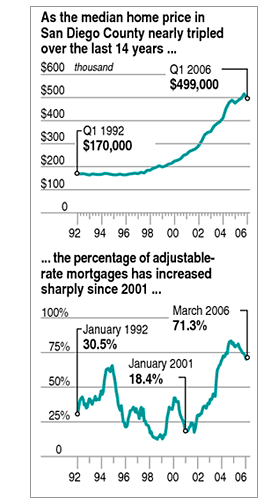Housing drop of 10%

Housing: 10% Decline May Trigger Financial Ruin
Astute reader Bob Decker wrote:
Many people don't seem to understand that if you put $100,000 down on a million dollar house . . . and the market drops just 10% . . .you lost your $100,000 of savings/equity and may not ever see it again.
If you need evidence that prices are falling, consider this USA-Today story, median prices fall, just one of many media stories documenting the decline in both new and existing home prices.
Let's take Bob's point and extrapolate it a bit. Consider a family which bought a home for $400,000 at last year's market top, and now for one reason or another find they have to sell: someone lost a job, got transferred, developed a chronic medical condition, etc. In many markets, they will find that the values in their neighborhood and price range have already dropped; in areas such as greater Boston, a 10% decline appears to be common.
Let's assume that the family was one of the rare home buyers who took out a conventional mortgage, with 20% down payment in cash and a loan balance of 80%. (As documented here earlier, up to 60% of recent home buyers have selected no down, interest-only loans.)
So let's do the math, given a 10% decline in values since they bought:
down payment: $80,000 (balance of $320,000)
Escrow and loan origination fees: $8,000 (2% of purchase price)
total mortgage: $328,000 (fees added to loan amount)
Difference between cost of renting an identical house ($1,500/month) and owning ($2,500/month): $1,000/month or $12,000 a year
(Here are the assumptions, plugged into the calculator at MSN Money: $328,000 mortgage at 6% assumed in June 2005, payment = $1,966 /month, property taxes of 1.5% per year plus homeowners/fire insurance = $2,500/month payment)
Value of tax write-off of mortgage interest: $6,000
Net loss in owning compared to renting: $6,000
Now, on the sale:
Sale price: $360,000 (10% decline from $400,000 purchase price)
Pay-off mortgage of $324,000 (as per the MSN Money amortization chart, about $4,000 was paid off in the year of ownership), leaving cash of $36,000.
Deduct 6% realtor's fees and closing/escrow costs of 1%: $25,000. Cash remaining: $11,000
Deduct $6,000 net loss due to owning rather than renting: cash remaining: $5,000
Value of house they qualify to buy with $5,000 down payment, assuming conventional 20% down: $25,000
Locations of homes for sale for $25,000: Northern Siberia; suburb of Chernobyl; yurt in Mongolia (must be moved with seasonal movement of herd)
Let's be frank: this poor family which started out with a solid $80,000 and 20% down, has essentially been wiped out by a "mere" 10% decline in housing values, once actual transaction and ownership expenses are accounted for. As for those new homeowners who bought with no money down, this example shows that the transaction fees alone will drive them into bankruptcy, even if they sold the house for their original purchase price.
As this chart of the San Diego market illustrates, the number of homeowners exposed to rising mortgage payments is over 2/3 of recent buyers. Combine this with the large number of people who bought homes with no money down, and you get a fuller picture of the damage which will be wrought by a "mere" 10% decline in housing values in an era of rising mortgage rates and "resets" of ARMs to much higher rates.
(According to the National Association of Realtors, the median first-time home buyer's deposit last year was just 2% of the price, while 43% of first-timers put down nothing.)
Thank you, Bob, for making this all-too-easy to forget point about leverage: works great in a rising market, not so great in a declining market.
From: Charles hugh smith-Weblog

0 Comments:
Post a Comment
<< Home